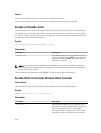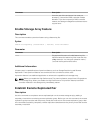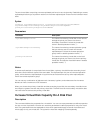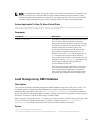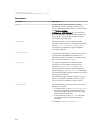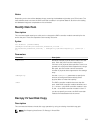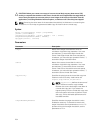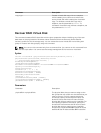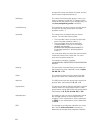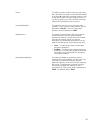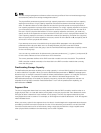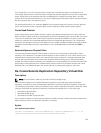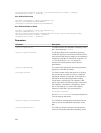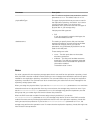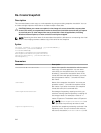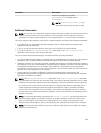
enclosure ID values, the drawer ID values, and the
slot ID values insqurare brackets ([ ]).
diskGroup The name of an existing disk group in which you
want to create the virtual disk. (To determine the
names of the disk groups in your storage array, run
the show storageArray profile command.)
newDiskGroup The name that you want to give a new disk group.
Enclose the new disk group name in double
quotation marks (" ").
userLabel The name of the virtual disk that you want to
recover. The user label has two parts:
• The virtual disk name. Enclose the virtual disk
name in double quotation marks (" ").
• The world wide name of the virtual disk,
virtualDiskWWN, in the form of a 16 byte
identifier, for example,
60080E500017B4320000000049887D77.
Enclose the identifier in double quotation
marks (" ").
You must enter both the virtual disk name and the
world wide name of the virtual disk. You must
enter the virtual disk name first.
For example: userLabel="engdata"
virtualDiskWWN=60080E500017B432000000004
9887D77
capacity The size of the virtual disk that you are adding to
the storage array. Size is defined in units of bytes,
KB, MB, GB, or TB.
offset The number of blocks from the start of the disk
group to the start of the referenced virtual disk.
raidLevel The RAID level of the disk group that contains the
physical disks. Valid values are 0, 1, 5, or 6.
segmentSize The amount of data (in KB) that the RAID controller
module writes on a single physical disk in a disk
group before writing data on the next physical disk.
Valid values are 8, 16, 32, 64, 128, 256, or 512.
dssPreallocate The setting to turn on or turn off allocating virtual
disk storage capacity for future segment size
changes. To turn on allocation, set this parameter
to TRUE. To turn off allocation, set this parameter
to FALSE.
SSID The storage array subsystem identifier of a virtual
disk. Use the show virtual disk command to
determine the storage array subsystem identifier.
236



